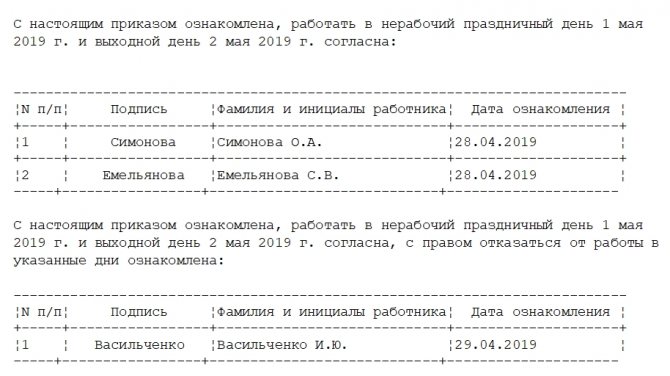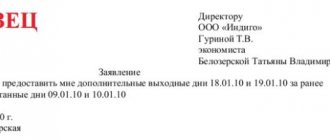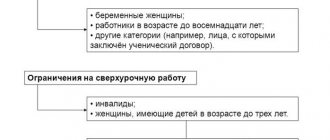An order to work on a day off is an integral part of the work process if employees are involved in performing their duties on weekends and holidays. It is worth paying attention to the fact that such documents must be issued strictly with the consent of the employees.
We have coronavirus-free files! Let's hang in there, guys! Stay at home, wear masks (that's right), don't panic. Let's break through! 03/30/2020
- Form and sample
- Free download
- Online viewing
- Expert tested
FILES
Exceptions and reasons
If on a day off it is necessary to eliminate the results of an accident, prevent it, or military operations are underway, then an order can be issued without the consent of the workers, without their signature on the document. But these are exceptional cases. In most situations, the reasons are formulated as urgent work to be done. However, when preparing documentation you should be careful and use your imagination. If employees work on weekends very often and the reason is always the same, then this may attract undue attention to the organization of the labor inspection.
Preferential categories of employees
Hiring employees to work on their days off is a delicate matter. There are people who, according to labor legislation, cannot be called to night work at all or use any of their additional time free from work. These include pregnant women (those who have provided a certificate of pregnancy). Moreover, this applies to any terms and trimesters of their pregnancy. These exceptions also include teenagers (minor workers), disabled people of all categories, mothers who have children under 3 years of age.
Trade union organizations usually fight for the rights of such employees. They may well successfully challenge an order to work on a day off, even if it has all the necessary signatures.
How to obtain consent
If there are no obstacles to exit and the employee is ready to express his consent, then he can do this in several effective ways:
- Write a separate application indicating all the necessary details. It must clearly state that the employee agrees to work on days off, at what rate and for what time.
- Sign a written notice of the opportunity to refuse, drawn up on behalf of the employer.
- Right on the order to work on a day off, he puts his signature with the note “I agree to be hired to work.” The text can be worded differently, as long as it emphasizes unambiguous agreement. This is the only way the paper will be drawn up legally.
How to place an order
At the beginning of the page write the full name of the company, publication date and serial number.
The sample text should display:
- The manager’s order itself regarding a specific employee, indicating names and job responsibilities;
- All circumstances that led to an emergency or man-made situation, a list of all persons who will work on the basis of this document, justification for approval on their part;
- An order to the company's accountant to carry out wage calculations under special conditions on generally accepted weekends or holidays;
- In case of refusal to pay, an explanation of the possibility of receiving an additional day off, on account of his working day;
- An order to the personnel service to deliver a notice to the employee that he is being involved in additional work activities;
The following factors may be used to justify the issuance of an order:
An official order from the head of a workshop or other structure. A copy of the official notice of the hired employee and his approval. Confirmation from the management of the enterprise is also required.
The final part is signed by everyone who will be involved in an emergency situation, including the signatures of the responsible persons.
Registration of orders for the personnel of the enterprise is carried out in the book of the same name by an office worker or personnel officer. The order is registered in order, the deadline for its release and the specific number are also noted.
It is worth clarifying that all such orders must be stored for up to 75 years , and therefore it is advisable to archive them separately from other documentation.
It is allowed to issue both paper and electronic versions of the order using unified office management programs.
In the case of issuing an additional order to attract other persons, the order can be registered under a letter, for example, 7a; repeating serial numbers are not allowed.
Regular attraction
If the entire work process is based on working on holidays and general weekends, then this must be noted in the employment contract and internal documentation of the organization. Such employees can be journalists, artists, professional athletes. In short, all those who work in the service and entertainment sectors.
Attention! If a schedule has been developed and Saturday and Sunday are working days for a specific employee, then there is no need to draw up an additional order about this.
Where to go
If an employee is forced to go to work on a rest day, but he does not want or cannot do this, he must follow the following algorithm:
- come to the regional labor inspectorate or call ( application is free );
- voice the essence of the problem clearly and clearly ( the name of the organization where he works, the reason for the refusal and other details that may be relevant );
- collect the necessary package of documents proving the fact of violation of labor rights ( from the list above );
- bring these documents to the labor inspectorate or send them by mail ( courier );
- Wait for your application to be reviewed ( may take up to 1 month ).
After the complaint has been considered, the inspector will draw up an act and send a letter to the manager indicating violations of the employee’s rights and asking them to eliminate these violations within a specific time frame. Upon correction of violations, the manager must send written notification to the inspector.
IMPORTANT! An employee can be sure of the anonymity of his application to the labor inspectorate. In order to remain anonymous, it is necessary to warn the inspector about this before presenting the problem.
Elements of an order to work on a day off
The law provides for a free form of this document. This means that the employer has the right to decide for himself how to formulate and create the document. However, the paper must meet a number of generally accepted rules and must contain:
- Name of company.
- The date of the order.
- City.
- Last name, first name, patronymic and position of the employee or several.
- Reason for attraction. For example, “due to an unforeseen production need.”
- Date of a weekend or holiday. If there are several of them, it is better to list each one separately.
- What the employee is entitled to for performing work duties during this time. According to labor legislation, an employee has the right to choose whether to receive financial compensation or an extraordinary day off (time off). If the second option is chosen, then a corresponding statement is written. It is registered separately.

An important point: even if an employee works part-time on a day off, he then takes the whole day off as compensation.
It is also worth noting that the form must be marked in the company’s internal documents as accepted for use. You can't invent something new every time. If this happens, then each time it must be accepted by a separate order, and this is not very convenient.
In case of violations
If the inspection body notices inaccuracies or direct violations of the labor code in the interaction between the employer and the employee, then it has the right to hold the employer accountable for this.
For organizations, fines for improperly inviting employees to work on a day off range from 30 to 50 thousand rubles.
There are cases when during a judicial investigation it was proven that responsibility for violations lies with an official. Or we are talking about a private entrepreneur. Then these fines are much lower: from 1 thousand to 5 thousand rubles.
Is it legal to have an employee with a shift schedule work on all of his days off?
I.V. Tarasova, author of the answer, consultant to Askon on labor issues and personnel records management
QUESTION
Can an employee with a rotating schedule (2/2 day shifts) be involved in working on weekends (with his consent and with double pay), so that he actually has no days off during the month?
ANSWER
Can not.
Involvement in work on a day off according to the meaning laid down by the legislator in Art. 113 of the Labor Code of the Russian Federation, is the attraction of an employee to work on a day that was scheduled as a day off.
Labor legislation does not establish restrictions on the number or frequency of attracting employees to work on weekends and does not make this provision dependent on the type of recording of working hours or the employee’s work schedule.
However,
if it is necessary to attract an employee with a shift schedule to work on days off or overtime (after the end of his working day (shift)),
the employer must take into account that the employee must not:
- work after the day shift for more than 4 hours for two days in a row;
- work two shifts in a row;
- the duration of rest between shifts should be twice as long as the duration of the shift itself;
- The duration of weekly uninterrupted rest must be at least 42 hours.
The rest of the time, with the consent of the employee, the employer has the right to involve him in work on a day off or overtime (no more than 120 hours per year).
JUSTIFICATION
In accordance with Art. 99 of the Labor Code of the Russian Federation, overtime work is work performed by an employee on the initiative of the employer outside the working hours established for the employee: daily work (shift), and in the case of cumulative accounting of working hours - in excess of the normal number of working hours for the accounting period.
An employer's involvement of an employee in overtime work is permitted in writing.
consent in the following cases:
- if it is necessary to perform (finish) work that has begun, which, due to an unforeseen delay due to technical production conditions, could not be performed (finished) during the working hours established for the employee, if failure to perform (non-complete) this work may lead to damage or destruction of the employer’s property ( including property of third parties located at the employer, if the employer is responsible for the safety of this property), state or municipal property or create a threat to the life and health of people;
- when carrying out temporary work on the repair and restoration of mechanisms or structures in cases where their malfunction may cause the cessation of work for a significant number of workers;
- to continue work if the replacement employee fails to appear, if the work does not allow a break. In these cases, the employer is obliged to immediately take measures to replace the shift worker with another employee.
Involving an employee in overtime work by an employer without his consent
allowed in the following cases:
- when carrying out work necessary to prevent a catastrophe, industrial accident or eliminate the consequences of a catastrophe, industrial accident or natural disaster;
- when carrying out socially necessary work to eliminate unforeseen circumstances that disrupt the normal functioning of centralized hot water supply, cold water supply and (or) sanitation systems, gas supply, heat supply, lighting, transport, communications systems;
- when carrying out work the need for which is due to the introduction of a state of emergency or martial law, as well as urgent work in emergency circumstances, that is, in the event of a disaster or threat of disaster (fires, floods, famine, earthquakes, epidemics or epizootics) and in other cases posing danger threat to the life or normal living conditions of the entire population or part of it.
In other cases, involvement in overtime work is permitted with the written consent of the employee
and taking into account the opinion of the elected body of the primary trade union organization.
Note:
Pregnant women, workers under the age of eighteen, and other categories of workers are not allowed to work overtime in accordance with the Code and other federal laws. Involvement of disabled people and women with children under three years of age in overtime work is allowed only with their written consent and provided that this is not prohibited for them due to health reasons in accordance with a medical report issued in the manner established by federal laws and other regulations legal acts of the Russian Federation. At the same time, disabled people and women with children under three years of age must be informed of their right to refuse overtime work upon signature.
The duration of overtime work should not exceed 4 hours for each employee for two consecutive days and 120 hours per year
.
Thus, the employer has the right to involve the employee in additional (overtime) work after the day shift for no more than 4 hours for two days in a row.
According to the general rule established by Part 1 of Art. 113 of the Labor Code of the Russian Federation, work on weekends is prohibited
and non-working holidays,
with the exception of cases of attracting employees to work on such days as provided for in this article (with or without the consent of the employees) - i.e. the employee is called to work on a day that was scheduled as a day off. Labor legislation does not establish restrictions on the number or frequency of attracting employees to work on weekends and does not make this provision dependent on the type of recording of working hours or the employee’s work schedule. However, if it is necessary to attract an employee working on a shift schedule to work on a day off, the employer must take into account the following:
According to Art. 103 of the Labor Code of the Russian Federation, shift work - work in two, three or four shifts - is introduced in cases where the duration of the production process exceeds the permissible duration of daily work, as well as for the purpose of more efficient use of equipment, increasing the volume of products or services provided.
When working in shifts, each group of workers must work within the established working hours in accordance with the shift schedule.
According to Art. 103 of the Labor Code of the Russian Federation, work for two shifts in a row is prohibited.
The duration of weekly uninterrupted rest is at least 42 hours ( Article 110 of the Labor Code of the Russian Federation ).
However, this norm does not contain any other conditions for its non-compliance.
Note:
In addition, it is necessary to take into account that for certain categories of workers the legislation establishes the maximum duration of daily work (shift) (Article 94 of the Labor Code of the Russian Federation) and the maximum duration of standard working hours per week (Article 92 of the Labor Code of the Russian Federation).
Taking into account the above, when engaging this employee to work beyond normal working hours, the employer should take into account that the employee must not:
- work after the day shift for more than 4 hours for two days in a row;
- work two shifts in a row (Part 5 of Article 103 of the Labor Code of the Russian Federation);
- the duration of rest between shifts should be twice as long as the duration of the shift itself (clause 10.24 SP 2.2.2.1327-03. 2.2.2. Occupational hygiene. Technological processes, materials and equipment, working tools. Hygienic requirements for the organization of technological processes, production equipment and working tools Sanitary and epidemiological rules (approved by the Chief State Sanitary Doctor of the Russian Federation on May 23, 2003)).
- the duration of weekly continuous rest is at least 42 hours (Article 110 of the Labor Code of the Russian Federation).
The rest of the time, the employer, with the consent of the employee, has the right to involve him in work on a day off or overtime.







